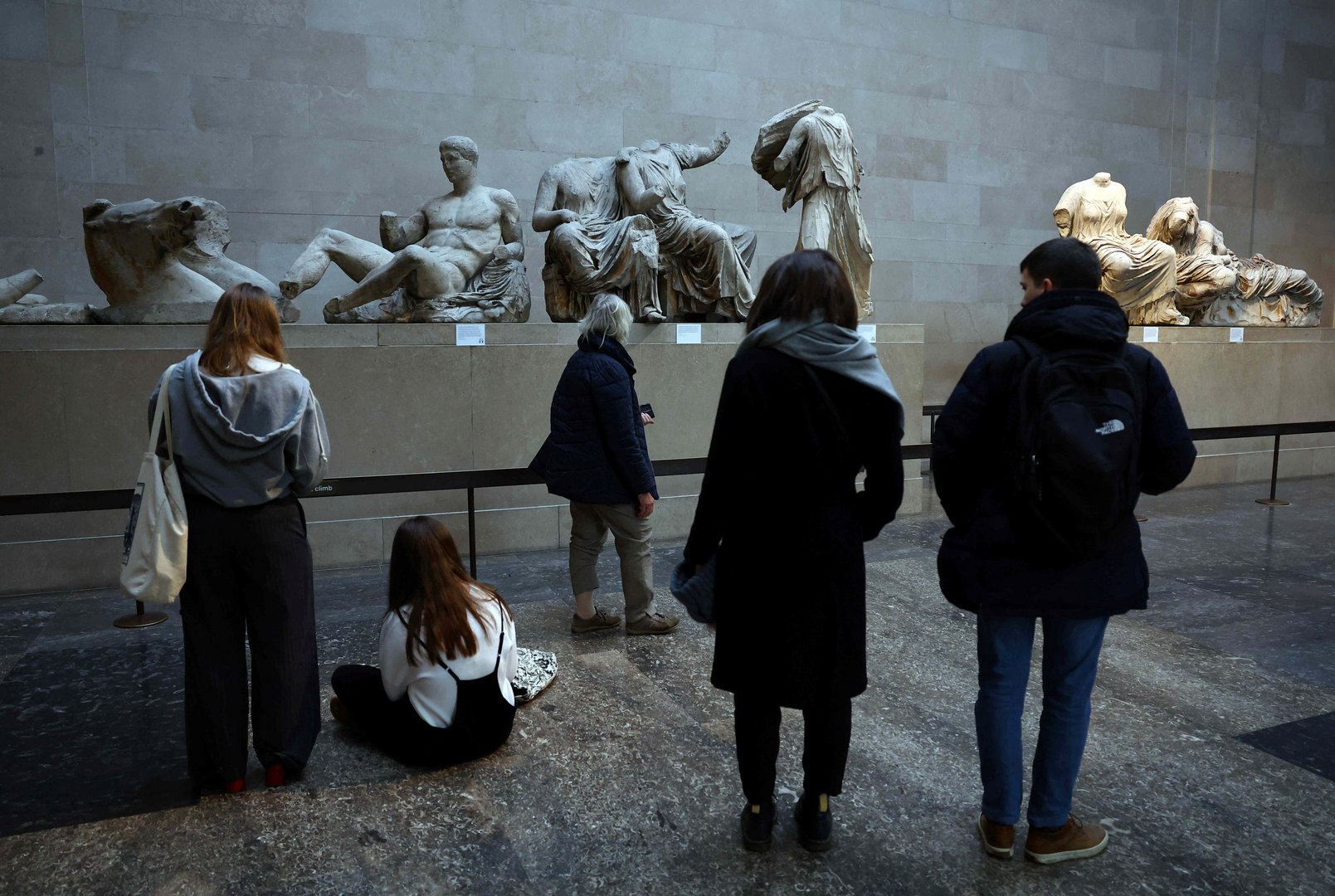British Prime Minister Rishi Sunak was undiplomatic and rude to cancel a scheduled meeting with Greek Prime Minister Kyriakos Mitsotakis last Monday over a few anodyne remarks he made to the BBC’s Laura Kuenssberg about repatriating the Parthenon sculptures from the British Museum back to the Acropolis in Greece.
Sunak was being patriotic when there was nothing to be patriotic about. No native British person identifies as the Greeks do with the Parthenon sculptures as part of their national identity.
The Greek prime minister was the main guest on the politics show last Sunday but Kuenssberg did not broach the return of the Parthenon sculptures until late into the interview. Instead, she began by asking him about irregular arrivals of refugees in Greece compared to irregular arrivals in Britain, and about the ferry that sank off the coast of Greece en route to Italy earlier this year in which a large number of refugees perished.
He replied that the circumstances in which the boat sank were being investigated, but that the focus of criticism should be against people smugglers. The answer to the problem, he said, was to prevent the departure of boats setting off on dangerous trips at embarkation. He said that Greece and the EU had reached an accommodation with Turkey to limit the flow of refugees to Greece and that it had reduced refugee arrivals in Greece considerably.
Kuenssberg then lobbed a cleverly constructed question that Mitsotakis welcomed with open arms. It did not seem the question was pre planned, but even if it was contrived, his reply was measured.
He was shown pictures of the Parthenon sculptures in Athens and in London and asked whether they look better at the Acropolis or in the British Museum. He said that it was clear they look better in the museum in Athens.
The question reminded me of an occasion in 1997 when the Italian tenor Luciano Pavarotti was asked which side he wanted to win in a football match between England and Italy that was to take place the following day. He replied, in his inimitable style, “England! but I am a liar.”
Mitsotakis first mumbled that the sculptures were essentially stolen, adding more clearly that the question was not one of ownership but of reunification of a single monument. It was, he said, as if you tore the Mona Lisa in half and put half of it on show in the Louvre in Paris and the other half in the British Museum in London and expected people to appreciate it torn apart.
Mitsotakis then picked up on an earlier discussion during the programme on the British economy and said that his government had managed to achieve growth and cut taxes in Greece. But Laura Kuenssberg pressed him further on the sculptures. She asked whether the Labour leader had promised the return of the sculptures to which he replied he would be seeing the Labour leader and the prime minister the next day and inform her of the outcome.
Of all the many TV interviews Laura Kuenssberg has done of political leaders, this one was one of the most civilised and good humoured. Mitsotakis sounded a nice guy and tried to set the dispute in a cultural rather than a legal context.
The Greek case is unanswerable if you think about it. Lord Elgin, who was ambassador to the Ottoman Empire, had the sculptures hacked off the Parthenon and transported them to Britain between 1801 and 1811. He later sold them to the British Museum, but the purchase could not have been without knowledge that Elgin had hacked them off the Parthenon thereby despoiling the monument.
Lord Byron who was a contemporary of Elgin claimed the Parthenon was plundered and set Elgin’s plunder at the Acropolis in verse in his poem, the curse of Minerva
…Survey this vacant, violated shrine;
Recount the relics torn that yet remain…
That all may learn from whence the plunderer came,
The insulted wall sustains his hated name:
For Elgin’s fame thus grateful Pallas pleads,
Below, his name—above, behold his deeds!….
Unlike Lord Byron the British prime minister’s position is that the sculptures were legally acquired under the laws at the time; are legally owned by the British Museum; UK law prohibits the removal of objects in its collection; and that there are no plans to change the law.
It is true that under the law as it stands the removal of the Parthenon sculptures to Greece is prohibited, except that it is possible under certain conditions to lend them abroad temporarily. But the issue is not legal, but whether Britain is prepared politically to allow the removal the sculptures permanently to Greece and change the law to do this.
The wider political issue, however, is whether Sunak is a fit and proper person to be UK prime minister. A couple of weeks ago this column suggested his government was immature. This week his decision to snub the Greek PM over the Parthenon sculptures shows he does not have a clue about foreign affairs.
What he should have done is called in his brand new foreign minister Lord Cameron for advice and even involved King Charles, who has a soft spot for Greece. He should have promised best endeavours to change the law if he could get cross-party support – all of which could have been done at no political cost. Instead, he showed himself a clueless vulgarian.
Alper Ali Riza is a king’s counsel in the UK and a former part time judge







Click here to change your cookie preferences